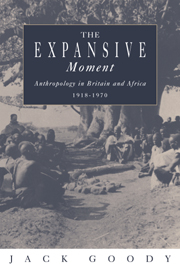Book contents
- Frontmatter
- Contents
- Introduction
- 1 The economic and organisational basis of British social anthropology in its formative period, 1930–1939: social reform in the colonies
- 2 Training for the field: the sorcerer's apprentices
- 3 Making it to the field as a Jew and a Red
- 4 Personal and intellectual friendships: Fortes and Evans-Pritchard
- 5 Personal and intellectual animosities: Evans-Pritchard, Malinowski and others
- 6 The Oxford Group
- 7 Some achievements of anthropology in Africa
- 8 Personal contributions
- 9 Concluding remarks
- Appendix 1 Changing research schemes
- Appendix 2 Towards the study of the history of social anthropology
- Notes
- List of references
- Index
3 - Making it to the field as a Jew and a Red
Published online by Cambridge University Press: 30 September 2009
- Frontmatter
- Contents
- Introduction
- 1 The economic and organisational basis of British social anthropology in its formative period, 1930–1939: social reform in the colonies
- 2 Training for the field: the sorcerer's apprentices
- 3 Making it to the field as a Jew and a Red
- 4 Personal and intellectual friendships: Fortes and Evans-Pritchard
- 5 Personal and intellectual animosities: Evans-Pritchard, Malinowski and others
- 6 The Oxford Group
- 7 Some achievements of anthropology in Africa
- 8 Personal contributions
- 9 Concluding remarks
- Appendix 1 Changing research schemes
- Appendix 2 Towards the study of the history of social anthropology
- Notes
- List of references
- Index
Summary
The position of anthropologists in relation to foundations, to other sources of funding and to the colonial authorities is brought out very forcefully in the story of Fortes' efforts to get to the field and carry out his research. Even with the collaboration of the International African Institute with the Rockefeller philanthropies on the one hand and the Colonial Office on the other, there were many difficulties in undertaking fieldwork, about whose merits opinions differed.
The Rockefeller plan called for the study of culture contact. The scheme was intended to be relevant to current issues, not to concern itself with antiquarian matters. Malinowski later wrote that they ‘had been training young men and women in practical anthropology’. An internal memo of March 1938 sums up the intention of the scheme as it had been conceived seven years previously.
After careful consideration the Council of the Institute decided to direct the research to be undertaken towards a better understanding of those aspects of native society making for social cohesion, the economics of communal life, the ways in which African society is being disrupted by the invasion of western ideas and economic forces, and the resulting changes in African institutions and behaviour. Thus the research would be concentrated on problems of most direct concern to colonial governments, educators and others engaged in practical tasks in Africa.
So conditions were laid down that had some influence on subsequent research, but nevertheless the results were not altogether as planned. The Rockefeller Foundation was interested in the effects of culture contact, specifically on native peoples. It was also interested in group projects.
- Type
- Chapter
- Information
- The Expansive MomentThe rise of Social Anthropology in Britain and Africa 1918–1970, pp. 42 - 57Publisher: Cambridge University PressPrint publication year: 1995



